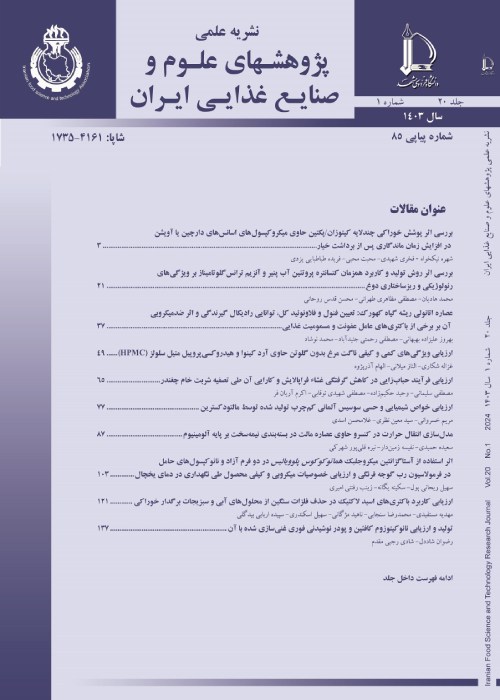Effect of transglutaminase on proteolysis and rheological properties of nonfat yoghurt
Microbil transglutaminase (MTG, E.C. 2.3.2.13) is a transferase enzyme that catalyses the acyl transfer reaction between -carboxyamide groups of peptide-bound glutamine residues and the primary amino groups including -amino groups of lysine residues. This will lead to the formation of new intra- and intermolecular crosslinks between proteins in order to formation of polymers with high molecular weight. Such crosslinks can modify the structure and functionality of proteins. Actually, crosslinking of milk proteins caused by enzyme leads to improvement in functional characteristics of proteins and formation of products with desirable sensory and rheological properties. Nowadays enzymatic cross-linking is widely used to improve the functional properties of proteins. Because undesirable side reactions that could lead to produce of toxic co-products by chemical modification may be minimized by enzyme catalysis. In last twenty years, consumer trends towards low or non-fat dairy products especially nonfat yoghurt have increased because of harmful effects of excess fat on human health. However, many consumers prefer low-fat products with a similar sensory quality to full-fat ones. The traditional methods used to improve yoghurt texture and decrease syneresis include the enrichment of dry matter (total solids) and/or protein content, as well as the addition of natural or synthetic gums. The polymerization of milk protein chains by transglutaminase for three-dimensional net stabilization in yoghurt provides new technology to prevent common problems in dairy product processing. In this study, the effect of microbial transglutaminase concentration, incorporation amount of sodium caseinate into milk and storage time on proteolysis, rheological properties and water holding capacity of nonfat stirred yoghurt was investigated using response surface method (RSM).
Twenty treatments were carried out according to a face-central composite design with three factors and three levels for each variable. The independent variables of the design were Enzyme concentration, amount of sodium caseinate and storage time. They were in the range of 0-2 Unit per gram of milk protein, 0-1.27 percent and 1-19 days, respectively. For preparation of samples, first of all the SNF and protein content of milk were fortified by addition of skim milk powder and sodium caseinate. The milk was tempered to 50°C in a water bath and subsequently transglutaminase was added at different concentration. It was incubated for 1 hour at 50°C in the water bath. Then it was pasteurized at 85°C for 15 min to inactive the enzymatic reaction and cooled to 45°C. After inoculation with the appropriate inoculum type according to the commercial recommendation, incubated at 42°C until the pH value of 4.6 was obtained. The yogurt samples were cooled in ice-water bath and stirred for 60 second using manual stirrer. Samples were distributed into sterilized plastic containers; they were sealed and stored at 4°C until examined. Characteristics of all yoghurt samples were evaluated, such as: proteolysis by using o-pthaldialdehyde (OPA) assay, apparent viscosity by Brookfield viscometer and water holding capacity. Proteolysis was carried on 3 steps including preparation of yoghurt water extracts, preparation of OPA reagent and absorbance measurements. Briefly, 150 µl of yogurt serum was added directly to 3 ml of OPA reagent in a 5 mL quartz cuvette and the solutions were mixed briefly by inversion prior to 2 min incubation at room temperature followed by absorbance measurement at 340 nm.
The statistical analysis of results showed that increase in enzyme concentration increased viscosity and water holding capacity of samples and decreased the proteolysis (p≤0.05). The presence of transglutaminase contributed to an increase in the viscosity due to its ability to form high molecular weight polymers from protein monomers. Crosslinking of protein chains stabilized the three-dimensional network of yoghurt gel and prevented yoghurt whey expulsion as a result of a decrease in gel permeability; thus, increasing water holding capacity. The lesser proteolytic activity with using transglutaminase may be explained by a combination of these two factors: 1) transglutaminase-induced cross-linked milk proteins were less suitable substrates for proteolytic enzymes in starter culture than native milk proteins and, 2) Proteolytic products such as peptides were crosslinked into the milk proteins by transglutaminase. It is known that the yoghurt may become too acidic and bitter due to excessive acidification and proteolysis even at refrigerator temperatures. The development of these defects generally determines the shelf life. Our results indicate that it may be possible to produce yoghurts with longer shelf life when using transglutaminase. Addition of sodium caseinate resulted in the increased viscosity and water holding capacity of samples. Also, during the storage period, water holding capacity was decreased and proteolysis of samples was significantly increased (p≤0.05).
The optimum conditions for the production of yoghurt was obtained using 1.42 Unit enzyme per gram of milk protein, 0.47 percent sodium caseinate with a storage period of 15 days. The overall desirability value was equal to 0.83. Under these conditions the predicted percentage of water holding capacity, viscosity and proteolysis being 27.51, 5220 cp and the absorbance at 340nm was 0.349 nm (as proteolysis index), respectively
- حق عضویت دریافتی صرف حمایت از نشریات عضو و نگهداری، تکمیل و توسعه مگیران میشود.
- پرداخت حق اشتراک و دانلود مقالات اجازه بازنشر آن در سایر رسانههای چاپی و دیجیتال را به کاربر نمیدهد.



